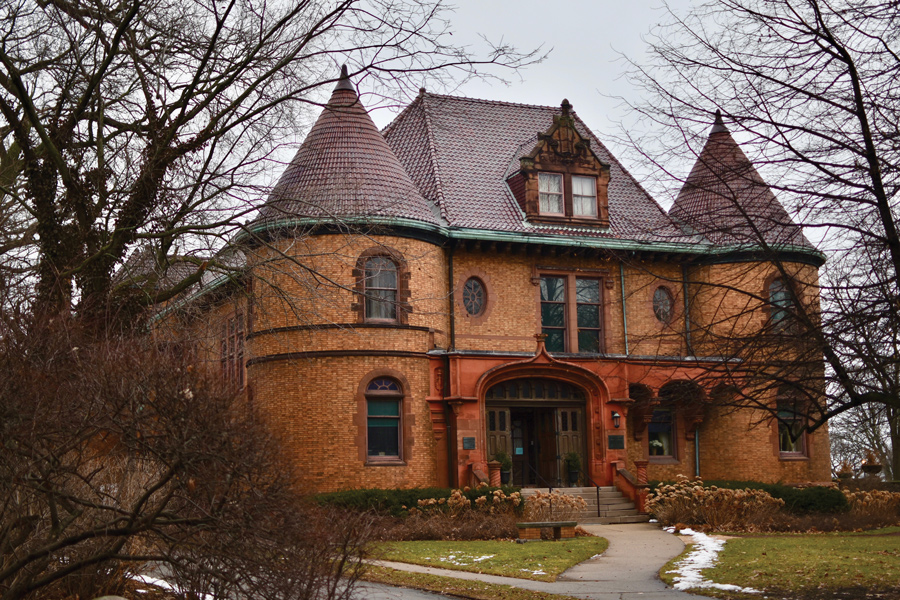As history unfolds, Evanston History Center creates a record
Daily file photo by Brian Meng
Evanston History Center. The center is launching a Community History Project, which asks residents to submit relics of COVID-19.
May 11, 2020
Snapshots of empty streets. Signs on storefronts urging shoppers to order takeout. Rocks, scattered around neighborhoods, painted with brightly-colored messages.
Today, these reminders of COVID-19 are routine sights, but thanks to the Evanston History Center Community History Project, photographs and artifacts from the pandemic will become part of a historical record.
According to Jenny Thompson, director of education and project organizer, the center is “rapid response collecting,” a method of preservation that involves collecting everyday objects tied to contemporary history.
Thompson said she has seen how documentation from the 1918 flu pandemic has informed our understanding of the current pandemic. She said it’s especially important to preserve relics of COVID-19 for future generations.
“I knew that this was something we really needed to do for the community,” she said. “I wanted to ensure that we document time, because it will disappear.”
Thompson said life amid coronavirus will be a “formative experience,” particularly for young children. With the archive, these children will have documentation of how the virus shaped their lives.
So far, the project has accumulated over 70 submissions. Many of them are photographs: family members on a walk, people wearing masks, signs on Northwestern’s campus reminding students and residents to practice social distancing. Even simple images are powerful representations of the current moment, she said.
“There’s one that I shared on social media, of a father and son in their bathroom giving themselves what he called quarantine haircuts,” she said. “The son is little, maybe eight or so. It’s just such an intimate, personal moment that reflects so much about what people are doing right now. Even though it’s sort of a mundane task, there’s a lot of layers of meaning to it.”
EHC has partnered with the Evanston Public Library to inform residents of the project. EPL has since featured the Community History Project on the library’s podcast “The Check Out” and its weekly newsletter.
EPL community engagement coordinator Jill Schacter said Evanston is community-centered, and the project is a testament to the tight-knit city.
“Evanstonians love their community so much,” she said. “The documentation will really include a lot of really soulful, beautiful examples of what kind of community Evanston is: active, engaged, caring.”
In documenting history, the center typically collects items chronicling local events after the fact, EHC executive director Eden Juron Pearlman said. EHC wanted to take a different approach with the pandemic, which Pearlman anticipates to be the most influential event in the lives of Evanston residents.
The project, she said, also helps streamline the difficult task of recording life as it happens.
“The hardest thing to do in the history business is to collect contemporary history,” Pearlman said. “It’s exceedingly hard to tell your own story in your own time.”
She added that the center plans to develop a digital archive, but hasn’t decided how it will preserve submissions.
For Thompson, the project not only records how COVID-19 will physically alter the city and change the lives of Evanstonians, but also creates a “symbolic” community amid profound isolation, she added.
“We’re feeling distant and disconnected,” Thompson said. “By each individual person contributing something, we’re kind of creating a community in this collection. It’s underscored by looking at what we’re going through and sharing our experiences now.”
Written contributions to the Evanston History Center’s Community History project can be made at EHC’s website: https://www.evanstonhistorycenter.org/all-events/. Images (photographs, pdfs) can be emailed directly to Jenny Thompson at [email protected]. Submission guidelines are also available on EHC’s website and upon request.
Email: [email protected]
Twitter: @herscowitz
Related stories:
— Evanston History Center celebrates International Women’s Day
— Evanston History Center to open exhibit on sound technology
— Evanston History Center receives grant for Dawes House renovations


